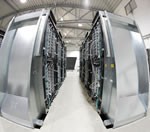
West Coast higher-education technology leaders begrudgingly admit it: An earthquake wouldn’t be a temporary inconvenience—a bad trembler could knock out IT infrastructure for weeks, unless the school has a partner.
IT officials from the University of Puget Sound in Tacoma, Wash., and Pomona College in Claremont, Calif., announced May 16 that they would host backup computer equipment for their partner school, allowing either campus to access student, faculty, and course information in hours rather than weeks.
Research universities and state schools often have similar backup arrangements in place with other state colleges and universities. These institutions store each other’s data on backup servers hundreds of miles from campus, ensuring that a school can operate in the aftermath of a natural disaster.
Many schools rely on what is known as an “iron mountain” approach to data recovery: Storing digital tapes loaded with vital campus data, and paying a company tens of thousands annually to store and maintain those electronic records. After an emergency, those tapes can’t be accessed until campus servers have been restored.
The insular culture of liberal arts colleges has left many small campuses vulnerable to worst case scenarios—especially schools on or near West Coast earthquake fault lines.
Campus IT decision makers said having to shut down a school for several weeks while the school’s technology infrastructure is rebuilt could be a deathblow for some colleges.
“Liberal arts colleges live and die by their administrative systems,” said William Morse, chief technology officer at Puget Sound. “If you can’t do that, you can really cease to exist very quickly. … This is a step in the right direction that a lot of liberal arts colleges should take a close look at.”
The Puget Sound-Pomona partnership might be the first of its kind, officials said. A natural disaster likely wouldn’t impact both schools, since more than 1,100 miles separates the University of Puget Sound and Pomona.
Each campus will store the other’s information on servers that would preserve eMail and website functions, financial services, campus membership and identity data, and course details.
Researchers at the Educause Center for Applied Research (ECAR) wrote in a recent report that the lack of colleges and universities with alternate site partnerships was “worrisome.”
Three in 10 schools said they had an off-campus data storage site that would be used as a backup in the event of a natural disaster, but only 16 percent of those backup sites were five miles from the campus. That means an earthquake or tornado could destroy those sites, leaving the institution without its most important computer data.
“…[Most] institutions would have to improvise in a widespread crisis that shut down primary IT operations and the immediately surrounding locale,” the ECAR researchers wrote.
Overcoming ingrained cultural attitudes toward collaboration, Morse said, could be the biggest hurdle in liberal arts colleges improving their disaster recovery systems.
“Research institutions are more about exchanges, while a liberal arts college has the main goal of teaching students. There’s not an external drive toward collaboration,” he said. “Liberal arts colleges tend to look internally when they’re solving problems … and we need to start working together if we’re going to prove our viability moving forward.”
Technologists from Pomona and Puget Sound said the schools’ partnership—which officially begins this summer—should serve as a model for similar-size campuses using the somewhat-outdated “iron mountain” approach to disaster recovery.
“I have had a vision about this for quite a long time, and I’m thrilled to see it become reality,” said Kenneth Pflueger, chief information officer at Pomona College. “It’s the one piece of our disaster recovery plan that was missing. I hope this might be a model for other small institutions.”
- Research: Social media has negative impact on academic performance - April 2, 2020
- Number 1: Social media has negative impact on academic performance - December 31, 2014
- 6 reasons campus networks must change - September 30, 2014